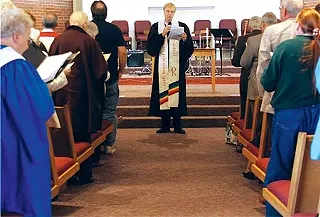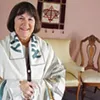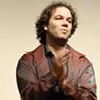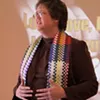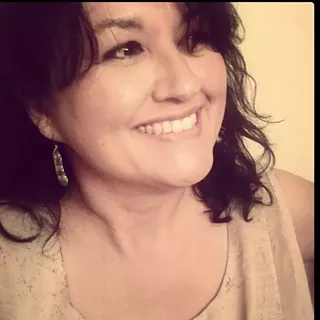When Stephen Van Kuiken looks back at his life in Cincinnati, he does so with a mix of sadness and disappointment—but he never uses the word "regret."
For 20 years, Van Kuiken was a Presbyterian minister. In 2003, church officials noticed that he was performing same-sex marriages and ordaining LGBT members in the lay ministry—in direct violation of Presbyterian Church law.
Van Kuiken, who now lives in Tucson, says he was told to stop, but he refused, leading to a trial in the church court. Presbyterian leadership essentially fired him, kicking him out of his church and refusing to accept another church he started before moving to Tucson.
Van Kuiken says it was a trying experience that left him divorced, exhausted and extremely disappointed in people he thought were committed to LGBT civil rights—but who wound up being more concerned about rocking the boat.
"I lost my career and became persona non grata in the church," Van Kuiken says. "My biggest disappointment is with the liberals who said, 'Shut up Steve; you're ruining it for us. Don't be so open. Just say you're not doing it anymore.'"
Van Kuiken's experience—which wasn't unusual, considering 10 other Presbyterian churches and their ministers took heat that same year for similar reasons—hasn't helped change the perception that faith communities just aren't a good option when you're gay. And anti-gay-marriage movements—such as California's Proposition 8 and Arizona's Proposition 102, which received big support from many churches—have helped widen the rift between some churches and the LGBT community.
Van Kuiken, who is straight, says he understands why those in the LGBT community are wary of churches and religion, but he's encouraged by the fact that there are about 45 churches in Tucson who say they are welcoming and affirming.
And most of those congregations really mean it.
In November 2009, Van Kuiken was hired by one of those churches—Rincon Congregational Church, a United Church of Christ-affiliated congregation.
Van Kuiken says at Rincon, he can perform same-sex marriages and help ordain LGBT lay ministers without threats or fears of being defrocked.
"I'm looking forward to doing my first same-sex marriage here. It's not only a continued expression of a couples' love for each other, but also a call to justice, a call to fairness and a call to equality. Faith to me is not an either-or. If that is what faith is, than I don't need it," Van Kuiken says.
Since Van Kuiken's exit, some Presbyterian churches have adopted the "more light" designation. More light churches, while they remain Presbyterian-affiliated, also belong to an organization called More Light Presbyterians (www.mlp.org) which works toward the full participation of LGBT people in the Presbyterian Church.
Van Kuiken says the "more light" definition is nice, but it isn't enough.
"There's a cancer in the mainline churches right now. Liberals with any kind of integrity are forced to be duplicitous in their language. I simply wasn't going to do it," Van Kuiken says.
"I can look at myself in the mirror. To me, it was an issue of integrity and being authentic. ... Even in states where same-sex marriage is legal, there are Presbyterian churches that will still not do (same-sex marriages)."
According to Sylvia Thorson-Smith, there is value in the "more light" model. A member of St. Mark's Presbyterian Church, Thorson-Smith points out that her church has been a longtime Tucson leader in social justice, especially during the Sanctuary Movement.
Thorson-Smith was a member of St. Mark's for 17 years while her husband served there as an associate pastor. They left when he took a position in Iowa, but returned to Tucson and St. Mark's as members when they retired in 2003.
A former gender-studies and women's-studies professor, Thorson-Smith is in the midst of leading a six-session class at St. Mark's on LGBT and religious perspectives on gender and sexuality. Topics have ranged from human sexuality in the church to gender issues. The Sunday, Jan. 31, class is on queer theology and will offer an introduction to theological perspectives of non-heterosexual Christians.
Thorson-Smith says she is active in the Presbyterian Church national general assembly, and every year, she works with others to change the church constitution to pass gay ordination.
"The last time, we had a much closer vote. I'm very much hoping it will come up again at the assembly meeting in Minneapolis in July. Every time, we get closer and closer. It's going to happen," Thorson-Smith says. "(LGBT rights) is a social movement whose time has come. It's just a matter of time. ... It's about injustice and human rights."
Thorson-Smith says St. Mark's congregants made the decision three years ago to become a "more light" church, even though the congregation was already welcoming and inclusive before the designation.
"We understand there is a profound mistrust, anger and alienation against Christianity and religion in general for the way (LGBT people) have been treated. I don't blame them, but for those who want to be part of a faith community, we hope to be a beacon," she says.
For Ari, a member of Congregation Chaverim, a reform synagogue, his faith community was an important part of beginning an entirely new life.
Ari, who asked that his last name not be used, sought counseling from Rabbi Stephanie Aaron at Chaverim when he began to go through a transition from female to male three years ago. Ari says he was raised as a Jew in Tucson, but he was surprised at how fully accepting and welcoming his congregation and rabbi were during his transition.
"Spirituality shouldn't be based on race or gender or gender diversity or sexuality. We should be able to go there and just be ourselves," Ari says. "The whole congregation did everything they could to make me feel welcome."
Ari also helped the congregation make changes to ensure the synagogue was completely inclusive. For example, he asked the congregation's board how the synagogue defines "family" in its bylaws; he discovered that the members didn't know.
They discovered that the bylaws, written in the 1980s, defined family as a mother and father; with Ari's help, that was changed to two adults. The congregation also prepared a diversity brochure to help with outreach.
But one of the aspects of Chaverim that's made him most comfortable is the rabbi.
Ari says Aaron was one of the first rabbis in Tucson to perform same-sex marriage ceremonies, and during his transition, her counseling helped him realize that changing his gender didn't change his place in the Jewish community.
"We talked about how it would be a good thing to welcome me as a Jewish male," just as newborns are welcomed into Jewish communities—through a naming ceremony, Ari says.
"She gave me my name. It became my legal name, but it had to include a little of my past and also a name that represents me now. We decided that I would not use the name until my transition was over, and once it was done, we coordinated the naming ceremony," Ari says. "I didn't want anything in my religious and spiritual life to be harmed in any way. I've always been very spiritual, ever since I was a kid. I needed to make sure that didn't go by the wayside, and I also needed to know what Judaism thought of (the transition)."
Ari says he and Aaron studied together and looked at Jewish writings that examined gender and religion.
"I think it might be easier in the Jewish community. We are taught not to proselytize, not to judge and to question everything," Ari explains. "But Rabbi Aaron is an important part of Chaverim, because she vocalizes so much love and emanates so much spirituality.
"I also know that being part of this community helps my life be balanced. I know a lot of people who have stepped away from religion because of the unaccepting attitudes, and the majority of them have been Christians. I've been lucky that for me, it has been just the opposite."
Aaron says the first same-sex marriage ceremony she performed in Tucson joined two women who felt it was especially important to have a Jewish wedding ceremony—and who wanted her to be part of their important day. The experiences of doing that wedding and working with congregants like Ari have taught her that there's more to being inclusive than just saying you welcome the LGBT community.
"When someone from the LGBT community walks through our doors, it's not just what we're saying. It's what we're doing," Aaron says. That means weddings and baby-naming ceremonies for lesbian and gay families—as well as for transgender congregants like Ari.
"It was really powerful to accompany him on his journey. He did share it with the community, so they also shared the journey—through the pain of it and the glory of it—and that culminated with his naming," Aaron says.
"No one thinks anything about (Ari's naming or his membership in the congregation). I honestly don't hear people griping. The congregation just recognizes that this is Ari, and thank God he's been able to be who he's always felt who he really is," Aaron says.
There are some cities with Jewish synagogues just for LGBT people. Aaron says she's glad there isn't one in Tucson, because synagogues need to include everyone.
"When I look out at the congregation, I want to see everyone—people who are gay, families, elders. You have to have a whole community, and I feel that we have that, and that means our community is working," Aaron says.
Most affirming Jewish congregations are usually reform, a more liberal and progressive denomination of Judaism. But Marc Paley, coordinator of the LGBT Jewish Inclusion Project at the Jewish Federation of Southern Arizona, says that attitudes are changing, and he hopes more conservative congregations will begin to be more inclusive.
Paley says the project started in Tucson about six years ago to help LGBT Jews identify congregations that are inclusive, and to help congregations learn how to connect with the LGBT community.
In October, congregations are asked to do an affirming sermon; after Thanksgiving, the project hosts a potluck Sabbath dinner. There's also a Hanukkah party and other opportunities for those in the Jewish LGBT community to come together.
"It's a really great opportunity for the LGBT community and Jewish community to become more connected, to find places where they can really worship and know that they are going to find affirming places," Paley says.
Paley is a second-generation Tucsonan who was raised Jewish. He says he was recently invited to teach a Jewish sexual-ethics class at a program for Jewish high school students.
"I think it was the first time an LGBT component was part of a discussion in a religious-education setting," he says.
Paley says the fact that some congregations now talk about being LGBT-inclusive is also a big change from the synagogue life of his childhood. In the 1980s, homosexuality was never mentioned. He didn't know if anyone was gay in his synagogue, or if there was a gay rabbi.
"I didn't really feel there was a place that felt welcoming and affirming when I was growing up, and there was absolutely nothing said about the identity of an LGBT person. ... It really left a hole in my heart, and that's one of the reasons I wanted to coordinate this project. I saw the potential," Paley says.
Recently, the project held its first awards ceremony to recognize local activists and leaders who've made a difference in the Tucson LGBT community and who exemplify Jewish values of charity and social justice. Paley says Temple Emanu-El approached him with the awards idea and wanted to create an annual awards event.
The Rainbow Keshet Awards ceremony, on Saturday, Jan. 23, was held at Temple Emanu-El—a reform congregation off North Country Club Road—with State Rep. Matt Heinz presenting awards to Ivy Schwartz, medical director of Compass Health Behavioral Care; Michael Mandel, director of transitional housing for Primavera Foundation; Scott Blades, executive director of Tucson Interfaith HIV/AIDS Network (TIHAN); and Jennifer Hoefle, program director for LGBTQ Affairs at the UA.
Like Rabbi Aaron, Briget Nicholson—pastor at the First Congregational United Church of Christ—says true diversity is one of the things she loves about her congregation, but diversity was something the church needed to work on when she took the position six years ago.
Nicholson says being inclusive in a UCC congregation isn't necessarily difficult, since UCC ordained its first gay man in 1972. As for her congregation, it probably helped that Nicholson is a lesbian.
The church did choose to be open and affirming in the 1980s, but when she joined as its pastor, she and the congregants wrote a new vision statement for the church, declaring that the congregation was always open, in all ways.
"So everything we do, we try to hold to that philosophy. It means that there are many pathways, and that everyone is welcome, no matter who they are on the journey," Nicholson says.
When Nicholson first arrived in Tucson, she went to a LGBT-marriage-rights rally, and saw a lot of placards making it clear that many protesters felt "the church was hurting queer folks."
"I understand that we haven't done a good job on the progressive left in Christianity. I went to the rally and came back and preached the next day that we are not going to let hatred be the only name associated with (our religion), and we've been trying to be out there in the community since then," Nicholson says.
Nicholson says being truly intrusive is a process that takes many steps—but it's definitely an obtainable goal. There are two women in their 90s who are members of Nicholson's church, and both have embraced inclusiveness.
"They give me so much hope that it is possible to live as more of a global family than we have in the past. I am their pastor, and our community is growing across the board. Straight, gay, married, widowed—we have it all," Nicholson says.
The Multifaith Working Group at Wingspan maintains a list of about 45 welcoming and affirming congregations. Included on the list is Water of Life Metropolitan Community Church, a Christian church affiliated with Universal Fellowship of Metropolitan Community Churches. The Tucson Weekly contacted Water of Life, but a representative did not return calls before deadline. To see the list of inclusive congregations, visit members.cox.net/rainbowinterfaith.
Full disclosure: Mari Herreras is a member of Congregation Chaverim.

